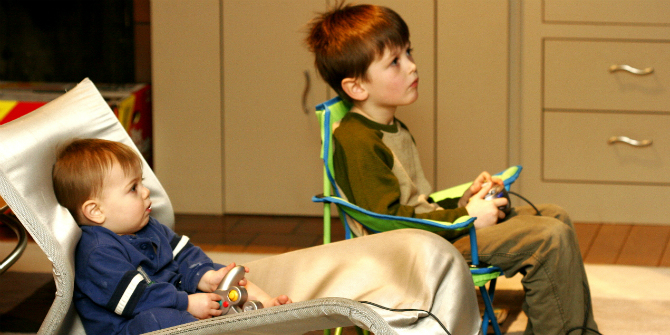 Looked-after children are especially vulnerable and privy to a number of risks online. This means that foster carers need improved safeguarding training and more digital literacy skills to manage a safe internet environment in their homes. In this post, Jennifer Pavlick summarises the findings of the 2016 online safety foster carer survey by Guardian Saints, discussing the risks and opportunities posed to looked after children. Jennifer is the editor of the Parenting for a Digital Future blog and is completing her MSc at the London School of Economics in the Department of Sociology. [Header image credit: S. Skyes 11, CC BY 2.0]
Looked-after children are especially vulnerable and privy to a number of risks online. This means that foster carers need improved safeguarding training and more digital literacy skills to manage a safe internet environment in their homes. In this post, Jennifer Pavlick summarises the findings of the 2016 online safety foster carer survey by Guardian Saints, discussing the risks and opportunities posed to looked after children. Jennifer is the editor of the Parenting for a Digital Future blog and is completing her MSc at the London School of Economics in the Department of Sociology. [Header image credit: S. Skyes 11, CC BY 2.0]
Looked-after children are some of the ‘most vulnerable children in our society’, with over 93,000 in care in the UK as of 2015. The Department of Education estimates that 60% are looked after because of experiences with abuse and neglect, which means that their internet safety is of particular concern. Given that many have experienced much upheaval in their lives, online contact and phones can become a point of stability and connection to a consistent network of friends or family.
Organisations that recruit foster parents must ensure both that carers can appropriately safeguard the children they care for online, and that they can help them retain access to these networks of support, making the most of the opportunities of online life. Guardian Saints is a non-profit company dedicated to delivering robust policy and practice regarding online safety and data protection. They recently published a report outlining key issues, concerns and challenges that foster carers experience when supporting the children they look after in their online safety.
Key risks
Carers need to feel confident navigating internet safety and various technological devices when 64% of looked-after young people have smartphones, and most have at least one additional device, such as a laptop or tablet. Carers were concerned about different types of internet risks, and 56% said that children they looked after had experienced one of the following, either in the past, or during their care:
- cyberbullying (21%)
- unplanned contact with birth parents (20%)
- access to inappropriate sites (17%)
- sexting (17%)
- internet addiction (11%)
- grooming (12%)
- radicalisation (2%).
Because unplanned contact often occurs via social media sites, location services built into many apps and sites must be carefully monitored by carers, so that birth parents cannot use social media to determine the exact location of the child in school or in the foster home.
One study about adopted families in Italy shows that in providing the means of unplanned contact, social media brings a new set of concerns, as a child’s right to know their origin (under UN CRC Articles 7 and 8) is blurred with their right to safe and protected growth. If not managed carefully, social media opens up the possibility for children to search and be searched from the age of 13, lacks procedures for professionals to intervene if the child needs to be protected, and may prompt unwanted contact by way of ‘people you may know’ features.
Key challenges
The majority of foster carers are over the age of 50, and many find themselves less confident using technology. When 58% of the children being looked after are between the ages of 11 and 17, it comes as no surprise that 60% of carers believe these children know more about technology than they do. This compares with the 2016 Ofcom survey where 48% of parents (not carers) of children aged 5–15 agreed with the statement ‘My child knows more about the internet than I do.’
Carers discussed the various challenges in trying to provide a safe internet environment in the home:
- Technical: 23% agreed with ‘I don’t know what controls to apply or where to apply them.’
- Convenience: 23% agreed with ‘Setting controls for children makes access for others too complicated.’
- Guidance: 21% agreed with ‘I need more training in applying age-appropriate controls.’
- Confidence: 20% agreed with ‘I know what to do but I don’t want to mess things up.’
Communicating about children’s online lives
Many carers (44%) reported that they use a combination of ‘hard controls’ (such as device and ISP parental controls) and ‘soft controls’ (such as time restrictions) to manage the children’s online lives. Since communication between children and guardians is key, it is promising that 74% said they had conversations with the children and young people to agree to terms about appropriate internet use, compared to 84% of parents in the 2016 Ofcom study who talk to their children about managing online risks.
As part of an EU Commission study on the impact of marketing, a survey about parental mediation strategies showed that methods of ‘enabling mediation’ (i.e. talking to the child or providing internet advice in the form of encouragement) as opposed to ‘restrictive mediation’ (i.e. ‘banning’) were positively associated with children experiencing an increase in both the opportunities and risks offered by the internet. It is therefore important to remember that fixating on minimising risks by way of internet restriction also minimises opportunities. And in the case of foster children, the risks are clear in light of unwanted contact with birth parents, but there are also opportunities to be had such as ongoing contact with friends or family, recording memories, finding a voice and finding a community.
Carers need more tools
While the majority of carers were happy with the online safety training they received from the local authority or fostering agency, 25% were interested in further training and guidance, particularly in terms of parental control and security settings. Most (88%) said they had received ‘General online safety awareness’ training, whether in the classroom or based online.
However, this is a learning process that must be continuous and evolving. As one carer said:
‘As there are always new dangers, new apps and sites such as Facebook change their settings, training needs to be ongoing and updated as often as possible.’
The fast-paced nature of technological change, combined with a cohort of carers who express a lacking sense of technological confidence, can also leave a feeling of hopelessness about their ability to create a safe internet environment:
‘As a carer, we are fighting a losing battle. There are so many routes to access online sites if a young person wants to. Their family give them a phone, they get another SIM card, they use friend’s devices … or even steal devices.’
Carers identified key challenges they experience with mobile phones and issues of secrecy, where they don’t feel they have control over the young people’s internet lives. They most often commented on difficulties with trying to apply controls for mobile devices, especially if the device is supplied by the birth parent, making the inbuilt parental controls settings inaccessible. Carers additionally expressed a lack of confidence managing ISP setting controls, a hurdle the Guardian Saints is already providing resources to overcome.
Conclusion
To ensure the online safety of looked-after children, two issues are clear from the carers’ responses:
- Carers need additional guidance and training to improve their technical capabilities and confidence so that the most effective controls are used at the right times, for the right children.
- Providers need to make parental controls more adaptable – many carers reported that they don’t use them because they don’t support the flexibility that is needed in their households, and make internet access for everyone in the house too complicated and often inconvenient.
Although 85% of carers said they have a clear understanding of how to report an incident that may occur due to a child accessing the internet, it is concerning that the remaining 15% wouldn’t know what to do. Improved tools from foster organisations and technology companies are important, not to encourage heavy-handed media management strategies among carers, but to equip them with the tools and a more confident sense of digital literacy.
Our research (and this survey) shows that more digitally confident parents may be more aware of the online opportunities available and choose ‘enabling mediation’ to deal with risks when they occur, minimising or avoiding actual harm in the process. Improving digital literacy may help foster carers and looked-after children in navigating the complex and particular set of risks and opportunities that they face in their lives online.
This post gives the views of the authors and does not represent the position of the LSE Parenting for a Digital Future blog, nor of the London School of Economics and Political Science.





